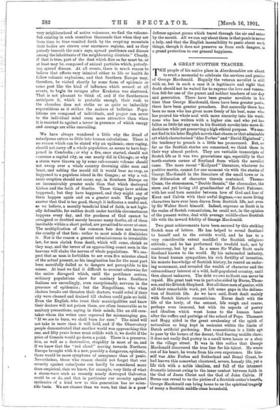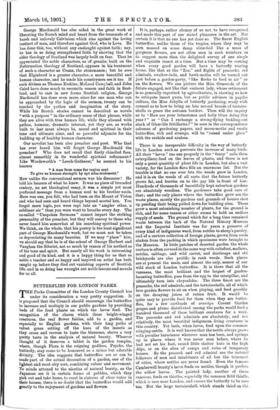A GREAT SCOTTISH TEACHER.
T"people of his native place in Aberdeenshire are about to erect a memorial to celebrate the services and genius of George Macdonald. Happily the veteran novelist is still with us, but in such a case it is legitimate and right that death should not be waited for to express the love and venera- tion felt for one of the purest and noblest teachers of our day and generation. There have been greater novelists in his time than George Macdonald, there have been greater poets, there have been greater preachers. But assuredly there has been no man who has given more freely of his best, none who has poured his whole soul with more sincerity into his work, none who has written with a higher aim and who yet has fallen so little (at any rate in his Scottish novels) into mere di- dacticism while yet preserving a high ethical purpose. We can- not find in his later English novels that charm or that admirable art which characterised "Alec Forbes" and "David Elginbrod " ; the tendency to preach is a little too pronounced. But, so far OA the Scottish stories are concerned, we think them in their way almost perfect. They are veritable transcripts of Scotch life as it was two generations ago, especidlly in that north-eastern corner of Scotland from which the novelist came. The more recent " Kailyard " literature, whatever its positive merits, cannot for one moment vie with the stories of George Macdonald in the literature of the small town or in the delineation of character therein contained. Thomas Cram, the stonemason, " Dooble Sannie," the shoemaker, the stern and yet loving old grandmother of Robert Falconer, with her soul torn asunder between love of God and fear of Knox and Calvin with their awful dogmas,—no more living characters have ever been drawn from Scottish life, not even by Sir Walter Scott himself. Indeed, supreme as Scott is in the realm of Scotch romanticism, he could not, in the opinion of the present writer, deal with average middle-class Scottish life with the inward fidelity of George Macdonald.
Two great achievements have been secured by this striking Scotch man of letters. He has helped to reveal Scotland to herself and to the outside world, and he has to a very considerable extent modified the Scottish religious attitude ; and he has performed this twofold task, not by controversy, but by art. In a sense Sir Walter Scott made Scotland known to the world. By his unbounded industry, his broad human sympathies, his rich fertility of invention, his minute knowledge of Scottish history, he reared an endur- ing monument, and revealed the wealth of character and the extraordinary interest of a wild, half-populated country, until then almost unknown. The debt we owe to Scott can never be repaid. His great task was in part also aided by Burns, Thom- son, and the Ettrick Shepherd. But all these men of genius, with all their remarkable work, yet left some gaps in the deline,a. tion of Scottish life. As we have said, Scott dealt mainly with Scotch historic romanticism. Burns dealt with the life of the lowly, of the outcast, life rough and coarse, perhaps even immoral, but with its aspects of poetry and idealism which went home to the human heart after the ruffles and periwigs of the school of Pope. Thomson and Hogg aided in the great awakening of the spirit of naturalism so long kept in restraint within the limits of Dutch artificial gardening. But romanticism is a little apt to pass by the homes of the decent, Godlearing middle class; it does not easily find poetry in a small town house or a shop in the village street. It was in this milieu that George Macdonald discovered the true line for his talent. He wrote out of his heart, he wrote from his own experience. He him- self was Alec Forbes and Sutherland and Donal Grant, he had known this somewhat cloistered, severe, homely life, yet a life rich with a noble idealism, and full of the intensest dramatic interest owing to the inner contest between faith in the God of Jesus Christ and the God of John Calvin. If Burns can reveal to us the pieties of a Scottish cotter's hearth, George Macdonald can bring home to us the spiritual tragedy of many a Scottish middle-class household.
George Macdonald has also aided in the great work of liberating the Scotch mind and heart from the trammels of a harsh and unlovely Calvinism which sins against the loving instinct of man, and therefore against God, who is Love. He has done this, too, without any onslaught against faith; nay, he has in so doing strengthened faith by showing that the older theology of Scotland was largely built on fear. That he appreciated the noble characters, as of granite, built on the Reformation theology of Scotland, appears in his treatment of such a character as Crann, the stonemason; but he sees that Elginbrod is a greater character, a more beautiful and human character, and he made his countrymen see it too. If such divines as Thomas Erskine, McLeod Campbell, and John Caird have done much to reconcile reason and faith in Scot- land, and to cast in new forms Scottish religion, George Macdonald has done even more, since for one man who can be approached by the logic of the sermon, twenty can be touched by the pathos and imagination of the story. While his Scotch stories cannot be described as novels "with a purpose" in the ordinary sense of that phrase, while they are alive with true human life, while they abound with pathos, humour, dramatic interest, yet they are, as works built to last must always be, moral and spiritual in their tone and ultimate aims, and so powerful adjuncts for the building up of healthy human character.
Our novelist has been also preacher and poet. Who that has ever heard him will forget George Macdonald the preacher P Who does not recall that finely chiselled face, almost unearthly in its wonderful spiritual refinement? Like Wordsworth's "Leech-Gatherer," he seemed to his hearers "A man from some far region sent To give us human strength by apt admonishment."
How unlike the conventional sermon was his discourse ! He told his hearers of what he knew. It was no piece of brocaded oratory, no set theological essay, it was a simple yet most profound message from a human soul to his brother souls. Here was one, you felt, who had been on the Mount of Vision and who had seen and heard things beyond mortal ken. You forgot mere logic, you were rapt into an "ampler ether, a sublimer air" than you were wont to breathe every day. The so-called "Unspoken Sermons" cannot impart the striking personality of the preacher, but they will convey to those who never heard him somewhat of his searching spiritual power. We think, on the whole, that his poetry is the least significant part of George Macdonald's work, but we must not be taken as depreciating its many beauties. If we may "place" him, we should say that he is of the school of George Herbert and Vaughan the Silurist, not so much by reason of his method as of his tone and spirit. But nearly all his work is interesting and good of its kind, and it is a happy thing for us that so noble a teacher and so happy and inspired an artist has both caught up before they died out vanishing aspects of Scottish life, and in so doing has wrought out noble lessons and morals for us all.







































 Previous page
Previous page